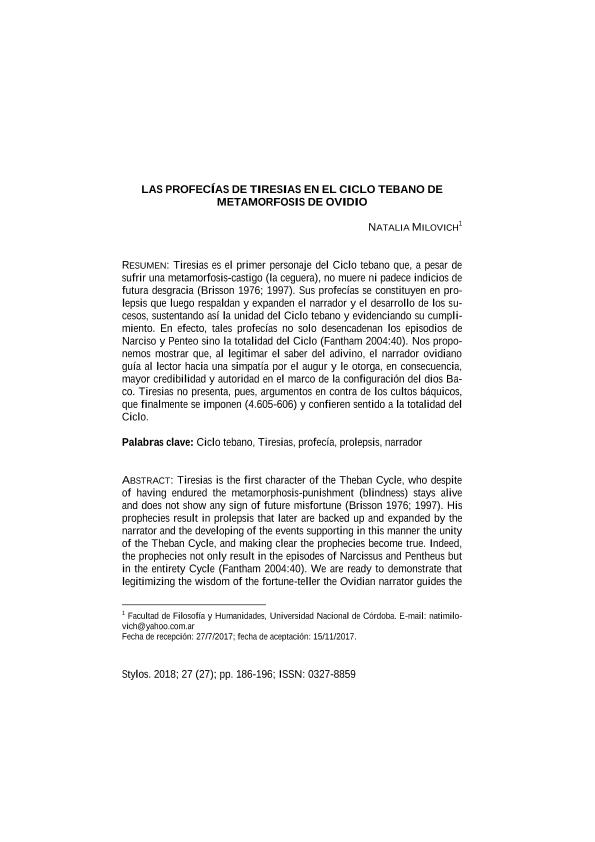Mostrar el registro sencillo del ítem
dc.contributor.author
Milovich, Natalia

dc.date.available
2019-11-19T17:23:52Z
dc.date.issued
2018-09
dc.identifier.citation
Milovich, Natalia; Las profecías de Tiresias en el Ciclo tebano de Metamorfosis de Ovidio; Instituto de Estudios Grecolatinos; Stylos; 27; 27; 9-2018; 186-196
dc.identifier.issn
0327-8859
dc.identifier.uri
http://hdl.handle.net/11336/89200
dc.description.abstract
Tiresias es el primer personaje del Ciclo tebano que, a pesar de sufrir una metamorfosis-castigo (la ceguera), no muere ni padece indicios de futura desgracia (Brisson 1976; 1997). Sus profecías se constituyen en prolepsis que luego respaldan y expanden el narrador y el desarrollo de los sucesos, sustentando así la unidad del Ciclo tebano y evidenciando su cumplimiento. En efecto, tales profecías no solo desencadenan los episodios de Narciso y Penteo sino la totalidad del Ciclo (Fantham 2004:40). Nos proponemos mostrar que, al legitimar el saber del adivino, el narrador ovidiano guía al lector hacia una simpatía por el augur y le otorga, en consecuencia, mayor credibilidad y autoridad en el marco de la configuración del dios Baco. Tiresias no presenta, pues, argumentos en contra de los cultos báquicos, que finalmente se imponen (4.605-606) y confieren sentido a la totalidad del Ciclo.
dc.description.abstract
Tiresias is the first character of the Theban Cycle, who despite of having endured the metamorphosis-punishment (blindness) stays alive and does not show any sign of future misfortune (Brisson 1976; 1997). His prophecies result in prolepsis that later are backed up and expanded by the narrator and the developing of the events supporting in this manner the unity of the Theban Cycle, and making clear the prophecies become true. Indeed, the prophecies not only result in the episodes of Narcissus and Pentheus but in the entirety Cycle (Fantham 2004:40). We are ready to demonstrate that legitimizing the wisdom of the fortune-teller the Ovidian narrator guides the reader to feel affection for the augur, and consequently gives him more credibility and authority in the frame of configuration of the god Bacchus. Then, Tiresias does not present arguments against Bacchus worships, which are finally imposed (4.605-606) and confer sense to the entirety of the Cycle.
dc.format
application/pdf
dc.language.iso
spa
dc.publisher
Instituto de Estudios Grecolatinos
dc.rights
info:eu-repo/semantics/openAccess
dc.rights.uri
https://creativecommons.org/licenses/by-nc-sa/2.5/ar/
dc.subject
CICLO TEBANO
dc.subject
TIRESIAS
dc.subject
METAMORFOSIS
dc.subject
BACO
dc.subject
PROFECÍA
dc.subject
PROLEPSIS
dc.subject
NARRADOR
dc.subject.classification
Otras Humanidades

dc.subject.classification
Otras Humanidades

dc.subject.classification
HUMANIDADES

dc.title
Las profecías de Tiresias en el Ciclo tebano de Metamorfosis de Ovidio
dc.type
info:eu-repo/semantics/article
dc.type
info:ar-repo/semantics/artículo
dc.type
info:eu-repo/semantics/publishedVersion
dc.date.updated
2019-10-24T18:18:06Z
dc.journal.volume
27
dc.journal.number
27
dc.journal.pagination
186-196
dc.journal.pais
Argentina

dc.journal.ciudad
Buenos Aires
dc.description.fil
Fil: Milovich, Natalia. Consejo Nacional de Investigaciones Científicas y Técnicas. Centro Científico Tecnológico Conicet - Córdoba. Centro de Investigaciones y Estudios sobre Cultura y Sociedad. Universidad Nacional de Córdoba. Centro de Investigaciones y Estudios sobre Cultura y Sociedad; Argentina
dc.journal.title
Stylos
dc.relation.alternativeid
info:eu-repo/semantics/altIdentifier/url/http://erevistas.uca.edu.ar/index.php/STY/article/view/2059
dc.relation.alternativeid
info:eu-repo/semantics/altIdentifier/url/https://dialnet.unirioja.es/servlet/articulo?codigo=6920306
Archivos asociados
